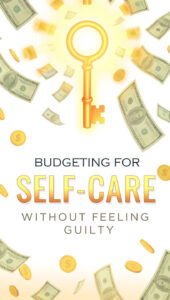Now Reading: How I Use Habit Tracking to Stay on Budget 📅
-
01
How I Use Habit Tracking to Stay on Budget 📅
How I Use Habit Tracking to Stay on Budget 📅
Because your budget doesn’t break from one bad purchase—it breaks when habits go unchecked. 💸🧠
💬 “I thought I had a money problem. But really, I had a habit problem. I didn’t overspend because I was careless—I overspent because I was unintentional.”
For years, I blamed my empty bank account on not making enough or unexpected bills.
But when I started tracking my habits, not just my spending, everything changed.
I realized:
-
It wasn’t the $50 dress that broke my budget—it was the habit of emotional shopping when I was stressed
-
It wasn’t the weekly takeout—it was the habit of not meal prepping on Sundays
-
It wasn’t the budget app—it was the habit of ignoring it until payday
So today, I’m sharing how habit tracking helped me finally stick to my budget—and feel peaceful doing it.
And the best part?
You don’t need a fancy app. Just a few free tools, honest self-reflection, and a little daily consistency 💗

🧩 What Is Habit Tracking, Really?
Habit tracking means writing down and reviewing the daily actions you take that shape your life—financially, emotionally, and practically.
Think of it as:
-
Your money mirror 🪞
-
A gentle accountability partner
-
A daily reminder that progress isn’t about perfection—it’s about showing up
By tracking your small actions, you start noticing patterns that either support or sabotage your budget.
💡 Why Habit Tracking Works So Well With Budgeting
Let’s break it down:
| 💰 Budgeting Alone | 🧠 Budgeting + Habit Tracking |
|---|---|
| You list your monthly goals | You build daily habits to reach them |
| You track only what you spend | You also track why you spend |
| Focus on numbers | Focus on behavior |
| Easy to abandon when life’s messy | Helps you stay consistent despite chaos |
Habit tracking brings your budget to life—because now you’re actively working on it every day, not just on payday.
📝 Step 1: Identify Your Budget-Supporting Habits
Ask yourself: What small actions would help me stay on budget this month?
Here are examples I track regularly:
-
✅ Checked my digital budget binder today
-
✅ Prepped meals / brought lunch from home
-
✅ No-spend day 💵
-
✅ Reviewed transactions for 10 mins
-
✅ Updated sinking fund progress
-
✅ Said “no” to impulse buy
-
✅ Completed a money affirmation (e.g. “I make intentional choices with ease.”)
Even 2–3 daily habits can be game-changing.
📓 Step 2: Choose Your Habit Tracker Style
Pick whatever fits your vibe and lifestyle best:
🟣 Notion Habit Tracker
-
Easy to customize + aesthetic
-
Add toggles, emojis, and reflections
-
Mobile-friendly + syncs to your budget binder
🟢 Google Sheets Habit Grid
-
Create a monthly tracker with checkboxes for each habit
-
Use conditional formatting for visual progress (like color-changing cells)
🩵 Printable Habit Trackers (Canva / Pinterest)
-
Choose a cute printable and physically tick boxes daily
-
Hang it near your desk, bathroom mirror, or journal
💬 Pro Tip: Make it feel fun, not like a chore. Color-coding, stickers, or emojis work wonders for motivation 🎨✨
⏳ Step 3: Build a Quick Daily Habit Review Ritual
Every night (or morning), spend just 3–5 minutes asking:
-
What habit did I follow today?
-
Did anything trigger overspending or emotional spending?
-
What’s one thing I can do better tomorrow?
💡 Even if your budget isn’t “perfect,” these daily reviews help you catch red flags early—before a small slip turns into a chaotic spiral.
💖 Real Talk: The First Week Is the Hardest
You’ll forget. You’ll miss a day. You’ll feel silly tracking “drank coffee at home” as a win.
But don’t stop.
Because the magic of habit tracking isn’t in the checkmarks.
It’s in the awareness, the intention, and the grace you give yourself along the way.
we have already uncovered how tracking simple daily habits (like checking your budget or skipping takeout) can do more for your wallet than any spreadsheet alone. Now in this second part, I’m showing you exactly how I built my system, what it looks like, and how you can copy it for free.
Because truthfully—this habit tracking method saved my budget more times than I can count.
Not by controlling me… but by centering me. 🧘♀️💵
Let’s get into the real tools, templates, and mindset that’ll help you stay consistent—without guilt, burnout, or overwhelm.
🧾 Step 4: Connect Habits to Budget Goals
This is the game changer 🔁
Instead of just writing down “Don’t overspend,” connect your habits to clear financial goals.
Here’s how I do it:
| 🎯 Budget Goal | 🔄 Daily Habit to Support It |
|---|---|
| Save $200 for vacation | “Skipped coffee run today ✅” |
| Stick to $400 grocery budget | “Checked meal plan before shopping ✅” |
| Pay off $500 credit card | “No-spend day ✅” / “Transferred $5 to debt ✅” |
| Reduce impulse spending | “Waited 24 hrs before buying ✅” |
💬 Once I linked my habits to outcomes I was excited about, staying on track felt empowering—not restricting.
📋 Step 5: My Favorite Free Habit Trackers (That You Can Copy Today!)
You don’t need a fancy app to make this work. Here are a few trackers I personally love and use:
✅ Google Sheets Budget Habit Tracker
-
Each row is a habit
-
Each column is a date (Month View)
-
Use ✅, ❌, or color codes
-
Add a “Weekly Score” at the end to gamify it!
📥 Search on Pinterest: “Free Google Sheets habit tracker for budgeting” — or let me know and I’ll send you one I use!
✅ Notion Habit Tracker
-
Minimalist, aesthetic, fully customizable
-
I group my habits under categories like:
-
Money 💰
-
Self-care 🌿
-
Home 🏠
-
💡 You can use progress bars, toggles, checkboxes, or even emojis. It’s so satisfying.
✅ Printable or Canva Habit Trackers
-
If you’re a pen-and-paper girlie 📓✨
-
Look for printable trackers that match your vibe (boho, pastel, neutral, etc.)
-
Use colorful pens, washi tape, stickers—whatever makes it feel FUN, not forced
💬 I hang mine near my laptop so I can see it daily. Even that visual nudge makes a difference!
🧠 Step 6: Weekly Habit Reflection (The “Secret Sauce”)
Once a week (I do it Sunday night with tea ☕), ask yourself:
-
🌱 Which habits did I follow most consistently?
-
💸 How did they help my budget this week?
-
🔄 What habits felt hard or forced?
-
✨ What’s one micro-change I can make next week?
These 10 quiet minutes? They keep me grounded.
No guilt. No shame. Just progress and peace.
🖋️ “I didn’t overspend because I was weak. I overspent because I was unaware. Tracking helped me see—and shift.”
💡 Bonus: Low-Energy Day Habits (for When Life Feels Too Much)
Some days are heavy. Budgeting will be the last thing on your mind. That’s okay.
So I created a “Low Energy Budget Habit List”:
-
✔️ Glance at my budget binder (even for 30 seconds)
-
✔️ Do a $5 transfer to savings
-
✔️ Say one money affirmation
-
✔️ Decline an unnecessary purchase
-
✔️ Watch one motivational YouTuber
That’s still progress, friend. Don’t underestimate the power of small wins 💗
🎯 Final Thought: Budgets Need Boundaries. Habits Create Them.
You don’t need more willpower.
You need systems that support your nervous system.
That’s what habit tracking gave me.
A sense of stability. Self-trust. Tiny nudges toward the woman I’m becoming—financially and emotionally.
So, if you’ve ever struggled to “stick to a budget,” maybe it’s time to stop beating yourself up—and start building habits that hold you up. 💞














